Afghanistan: UN's top women meet Taliban over female aid worker ban
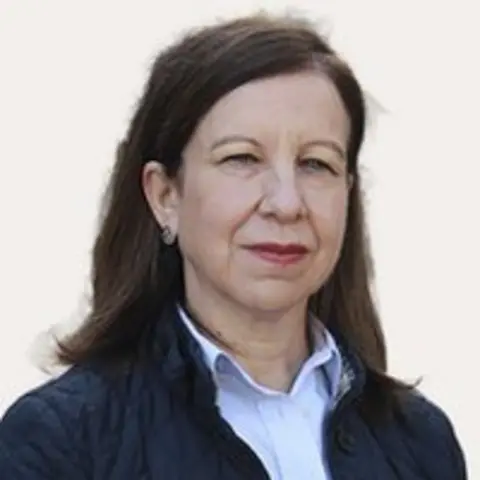
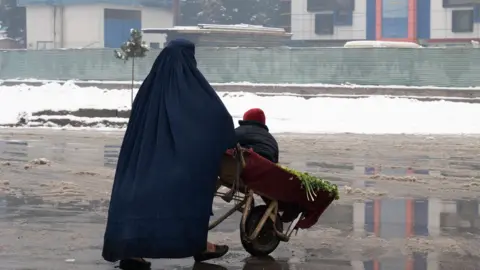 AFP
AFPIn a country where women are barred from university and secondary schools, and banned from many workplaces, the world's biggest aid operation is now at risk of failing those who desperately need it.
And it's happening in the cruellest depths of winter when famine and frostbite are knocking at the door.
In the middle of a deepening crisis, the most senior UN delegation to visit Afghanistan since the Taliban swept to power in 2021 has flown into Kabul.
The UN secretary general dispatched his deputy Amina Mohammad, the UN's most senior woman, with a team which also includes the head of UN Women, Sima Bahous.
They've been tasked with speaking to senior Taliban leaders at the highest-possible level about reversing restrictions, including a new ban on female aid workers, now seen to endanger urgent life-saving humanitarian operations.
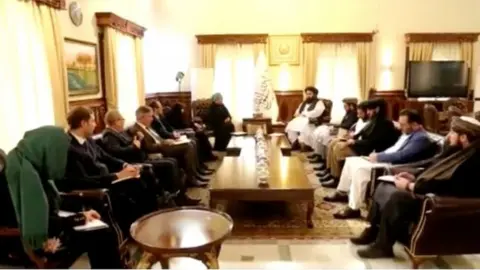 Reuters
Reuters"People are freezing and time is running out," emphasises Ramiz Alakbarov, the UN's humanitarian co-ordinator in Afghanistan in a statement which emphasises the all too obvious.
"We need to build shelters now but, in this conservative society, if we don't have female aid workers to speak to women in the families, we can't do this work."
It's not just that the UN has sent a senior delegation, they've also sent one headed by women with decades of experience.
"If there are women in the room, there is a greater chance that the uncomfortable conversations about women will take place," said one aid official who often sits in the room during efforts to reconcile the Taliban government's demands with international norms on human rights.
There's often been criticism that, all too often, foreign delegations send men-only teams which reinforce conservative Taliban views of their world.
The world's top table, the UN Security Council, recently condemned with unusual unanimity the "increasing erosion for the respect of human rights and fundamental freedoms".
The first Taliban official to meet the visiting delegation in Kabul was acting Foreign Minister Amir Khan Muttaqi.
On social media, his spokesman said the meeting began with the minister expressing hope that the "delegation would portray Afghanistan's true picture to the world".
He also reiterated the Taliban argument that the absence of international recognition of their rule, along with sanctions, was hindering their ability to govern effectively.
Across Afghanistan, temperatures are plunging to as low as -17C and even lower in mountainous areas.
Electricity is erratic or absent, and millions of families are struggling to make it through the night. Hardscrabble lives in one of the world's poorest countries have always been harsh - but not as harsh as this.
"We cannot provide humanitarian assistance in Afghanistan without the participation of half the society," is the urgent mantra of aid agencies struggling to respond to the new Taliban government edict restricting Afghan female aid workers.
Some aid agencies have temporarily suspended their operations. The ruling is the latest in a raft of rules in recent months which also banned women from attending university, socialising in public parks, or even going to women-only gyms.
Taliban leaders say conditions compliant with their interpretation of Islamic Sharia law and Afghanistan's conservative traditions must first be readied.
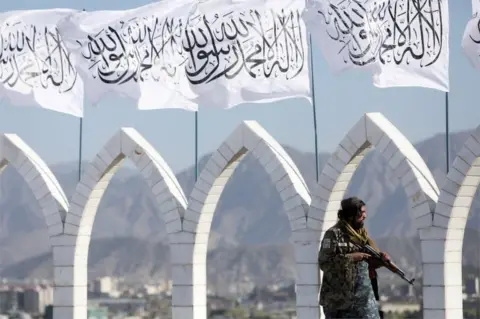 Reuters
ReutersThere's been some movement on this latest ban.
Within the Taliban system, some officials understand the gravity of these new rules.
The Health Ministry has now clarified that women can work in the health sector where women doctors and nurses are absolutely essential. That's triggered the resumption of some vital health programmes.
"While the majority of our programmes remain on hold, we are restarting some activities - such as health, nutrition and some education services - where we have received clear, reliable assurances from relevant authorities that our female staff will be safe and can work without obstruction," announced Save the Children in a statement this week.
Samira Sayed Rahman, of the International Rescue Committee in Kabul, underlined the need for Afghan women to work everywhere, from door-to-door surveys in the field to desks in the office.
"We are taking a pragmatic approach, working with Taliban officials' sector by sector," she told the BBC.
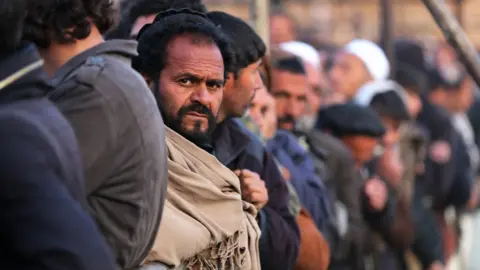 AFP
AFPThese aren't just concerns of the outside world. In one province after another, tribal leaders and religious scholars have been imploring Taliban leaders to open girls' secondary schools and provide more opportunities for work.
On our visit to the remote central highlands of Ghor last summer, we heard from farmers and their families how timely interventions by the UN World Food Programme last winter pulled some districts from the brink of famine.
"We feel the world is now forgetting us," one farmer lamented, as he brandished dried shafts of wheat, a painful symbol of years of punishing drought which have deepened the hardship.
This high-level UN delegation started their mission by first visiting Afghanistan's neighbours, as well as to the Organisation of Islamic Cooperation (OIC) to underscore what the UN has called "the importance of the international community speaking with one voice with a unified approach".
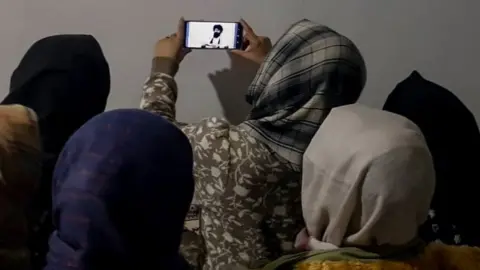 EPA
EPAThis UN visit, at this time, is an important signal to many Afghans and their allies who feel much of the world seems to have forgotten a country where they once invested so much commitment and cash.
"Where are the Nato countries that rushed through the door in 2021?" demanded Jan Egeland, the secretary general of the Norwegian Refugee Council.
In a message posted last week on Twitter during his own visit to Afghanistan, he discarded any niceties about the US-led pull out which played a part in the Taliban takeover. "You left 40 million Afghans with us."
